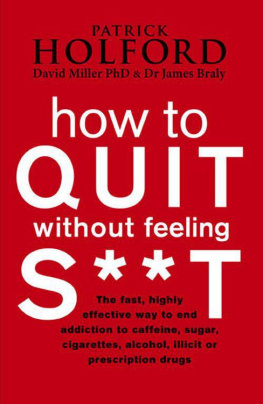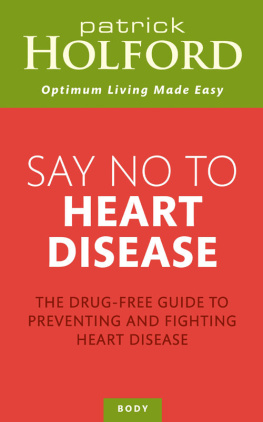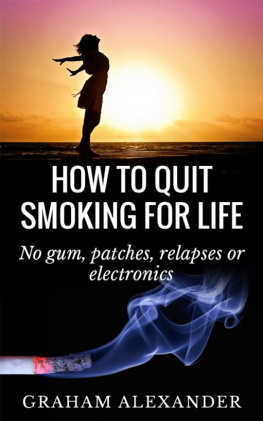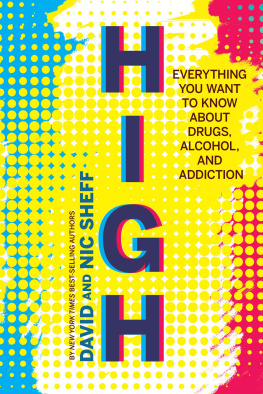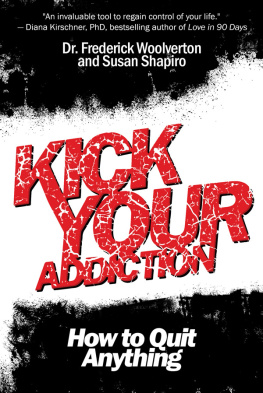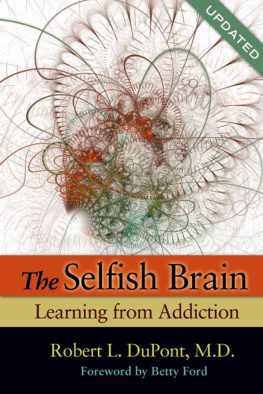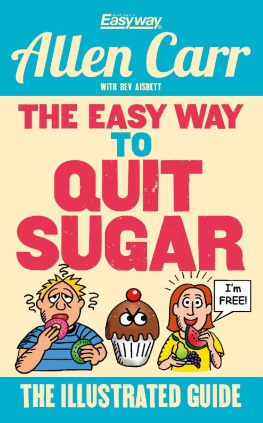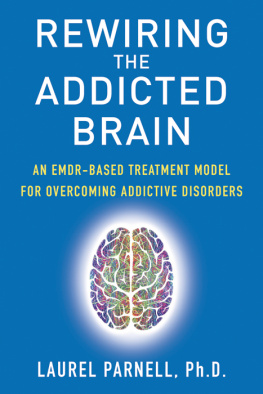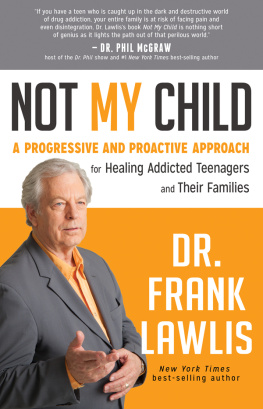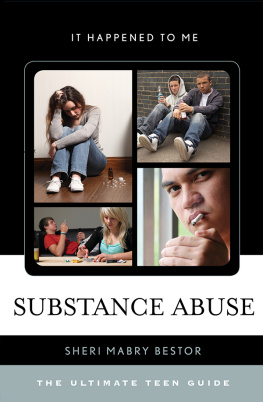Published by Hachette Digital
ISBN: 978-0-748-12515-9
All characters and events in this publication, other than those clearly in the public domain, are fictitious and any resemblance to real persons, living or dead, is purely coincidental.
Copyright 2008 by Patrick Holford with David Miller and Dr James Braly
All rights reserved. No part of this publication may be reproduced, stored in a retrieval system, or transmitted, in any form or by any means, without the prior permission in writing of the publisher.
Hachette Digital
Little, Brown Book Group
100 Victoria Embankment
London, EC4Y 0DY
www.hachette.co.uk
This book is dedicated to all the people who have tried,
and failed, to break free from addiction. We hope this book
will give you the missing piece you have been looking for.
The advice and insights offered in this book, although based on the authors extensive experience, are not intended to be a substitute for the advice of your doctor or other suitably qualified person.
Neither the publishers nor the authors accept any responsibility for any legal or medical liability or other consequences which may arise directly or indirectly as a consequence of the use or misuse of the information (nutritional or otherwise) contained in this book.
You are advised to seek medical and/or nutritional advice from a suitably qualified practitioner about the treatment of your specific condition and/or before changing or ceasing any recommended or prescribed medication or nutritional or other treatment programme. You are also advised to seek medical and/or nutritional advice from a suitably qualified practitioner before taking any medication or nutritional supplement(s) or adopting any other treatment programme.
Patrick Holford BSc, DipION, FBANT is a leading spokesman on nutrition in the media, specialising in the field of mental health. He is author of 30 books, translated into over 20 languages and selling over a million copies worldwide, including the Optimum Nutrition Bible and Optimum Nutrition for the Mind.
Patrick Holford started his academic career in the field of psychology. In 1984 he founded the Institute for Optimum Nutrition (ION), an independent educational charity, and was involved in groundbreaking research showing that multivitamins can increase childrens IQ scores research that was published in the Lancet and the subject of a Horizon documentary in the 1980s. He was one of the first promoters of the importance of zinc, antioxidants, essential fats, low-GL diets and homocysteine-lowering B vitamins such as folic acid.
He is director of the Food for the Brain Foundation and director of the Brain Bio Centre, the Foundations treatment centre for people with ADHD and autism, depression, dementia and schizophrenia, and those recovering from addiction, where a nutritional approach is used. He is an honorary fellow of the British Association of Nutritional Therapy. He teaches, researches and pioneers nutritional approaches to mental-health problems.
Patricks work in addiction Patrick has had a major interest in addiction since the 1970s when he graduated in psychology. In his holidays he worked in treatment centres, ranging from halfway houses in the East End of London (whose residents would sometimes resort to hairspray to get their fix) to residential treatment centres for professionals at the other end of the social scale. He also worked in a treatment centre for heroin addicts.
He later specialised in mental illness, from depression to schizophrenia, and became convinced that nutrition was the vital missing key, since the brain not only depends on, but is literally built from, nutrients commonly lacking in our Westernised diets. He studied the approaches of the late Dr Linus Pauling, a twice Nobel prizewinner, and became the student of Dr Abram Hoffer, who pioneered nutrition-based approaches to addiction back in the 1960s, with amazing success. David Miller PhD has worked in the addiction field for 30 years. He was associate professor of addiction studies at Graceland University in Missouri, where he was on the faculty for eight years. Before that he taught addiction studies at Park University in Missouri for 11 years.
Davids work in addiction Over the last 30 years David has practised addiction counselling in private practice, in an intensive outpatient treatment programme, in a detoxification programme, in a family intervention practice and in a food addiction programme. He has also acted as consultant to numerous treatment centres.
The focus of his work and research has been on finding effective treatment methods to aid those for whom traditional treatment has not worked. His research has led him to the conclusion that many of these people are not without motivation but are attempting to cope with physical problems that interfere with their ability to stay clean or sober. He has developed strategies for increasing sobriety skills and has pioneered nutritional approaches for preventing relapse that address the physiology of addiction.
has been in recovery from alcoholism himself since 1974. Since that time, he has had a desire to pass on what he learned the hard way to those people for whom staying sober is most difficult. His own recovery was extremely difficult for several years. He struggled with hypersensitivity, mood swings, irritability and anger outbursts, even while working as an addiction professional. After several years he found relief from the most disturbing symptoms by taking amino acid supplements recommended by a colleague. This put him on a search for more effective ways to relieve abstinence symptoms. He worked with different types of addiction, including food addiction in people with type 2 diabetes, most of whom struggled with abstinence symptoms that lasted over a long period of time. He pursued and utilised various methods of reducing those symptoms, the most successful being the nutritional strategies we offer you in this book. Several years ago David met Dr James Braly, who has researched, improved and refined nutritional therapy. Dr Braly, David and his wife Merlene have worked as a team committed to furthering this work. Merlene, an expert in addiction and a skilled writer and communicator, also contributed greatly to the writing of this book.
Dr James Braly has specialised in alternative and nutritional treatments for numerous chronic conditions, including addiction, for 30 years and is currently researching nutritional approaches for addiction. Dr Braly has authored many books including Dr Bralys Food Allergy and NutritionRevolution, Dangerous Grains, The H Factor and Hidden Food Allergies. He has helped establish nutritional treatments in many medical clinics and treatment centres in the US.
Jamess work in addiction Working with David and Merlene Miller, James Braly has pioneered and developed a highly effective nutritional therapy for addiction. He conducted the first semi-quantitative study of efficacy and safety of intravenous and oral nutritional therapy for recovering alcoholics. He introduced and popularised testing for and treating hidden (IgG) food allergies, the concept of leaky gut syndrome and the importance of lowering homocysteine factors that affect many people recovering from serious addictions.
During his clinical years in the 1980s, James often made use of high-dose supplements and vitamin and mineral therapy to help addicted clients through severe withdrawal symptoms while coming off coffee, sweets and other addictive foods. Years later he was approached by the Millers to research and develop an intravenous nutrient formula and protocol of diet and supplements that could rapidly reverse sobriety symptoms in recovering alcoholics and drug-dependent clients. For several years he has focused exclusively on helping those with some of the worst addictions, who have struggled to become and stay drug-free or sober.

